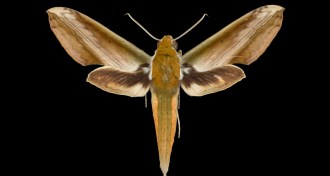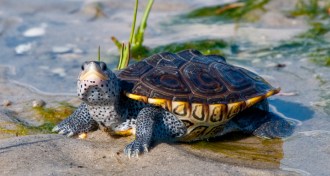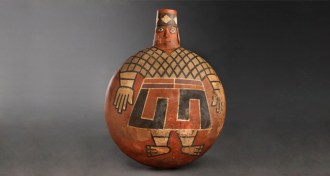News in Brief
-
 Astronomy
AstronomyThe solar system has a tail
Clover-shaped clumps of charged particles extend billions of kilometers in our wake.
By Andrew Grant -
 Astronomy
AstronomyClouds may keep exoplanets cool
Even when close to their stars, other worlds could harbor liquid water.
By Erin Wayman -

-
 Life
LifeDeadly flu virus flourishes in lung cells
H7N9 influenza's clinging ability in humans and birds raises concerns about increased transmission between species.
-
 Animals
AnimalsHawkmoths squeak their genitals at threatening bats
Sounds of an approaching predator inspire ultrasonic rasping in insect prey.
By Susan Milius -
 Animals
AnimalsHighlights from the Evolution 2013 meeting
Selections from the meeting include a natural fish experiment, terrapins' light displays and why a variety of eye colors persist in people, presented June 21-25 in Snowbird, Utah.
By Susan Milius -
 Archaeology
ArchaeologyPre-Inca empire tomb found untouched in Peru
Gold jewelry, bronze axes and dozens of bodies were among the contents of the Wari empire ceremonial room.
By Bruce Bower -
 Life
LifeGenes in wheat relatives help stave off stem rust
Wild and obscure species provide resistance to deadly fungus.
-
 Planetary Science
Planetary ScienceVoyager 1 on fast track toward interstellar space
More than 35 years after launch, the probe finally nears the solar system's edge.
-
 Health & Medicine
Health & MedicineExperimental type 1 diabetes treatment shows promise
Findings in a small group of patients hint that a DNA-based therapy might work, but the effects fade after treatment stops.
By Nathan Seppa -
 Health & Medicine
Health & MedicineNo link found between vaccines and nerve-damaging condition
Recently immunized people are not at an increased risk of developing Guillain-Barre syndrome, a nerve-damaging condition.
By Nathan Seppa -
 Health & Medicine
Health & MedicineA wobble of the noggin reveals the workings of the heart
Pulse can be measured by examining a video of subtle head motions.
By Meghan Rosen